初中英语冠词课件
- 格式:doc
- 大小:48.00 KB
- 文档页数:5


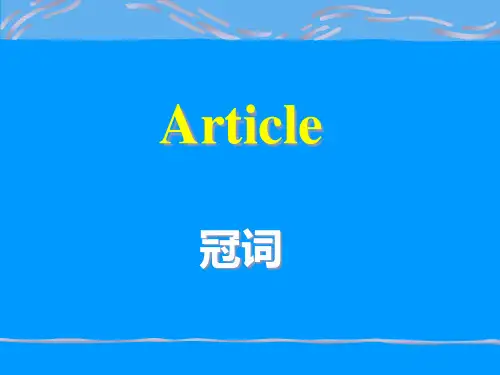
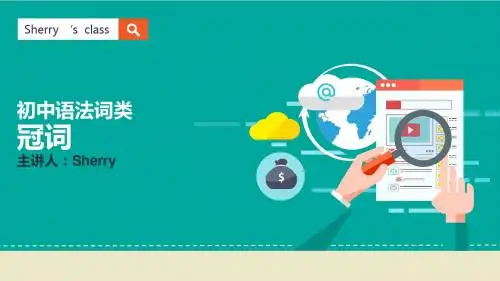
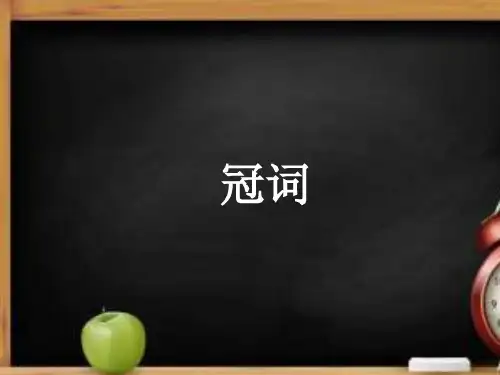

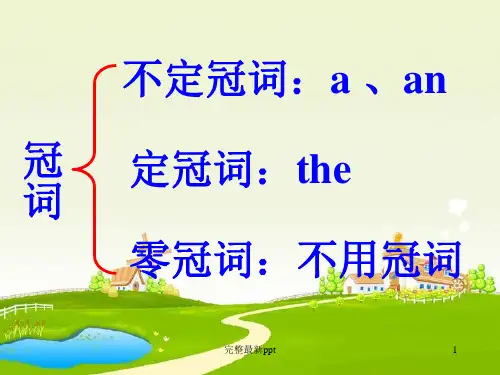

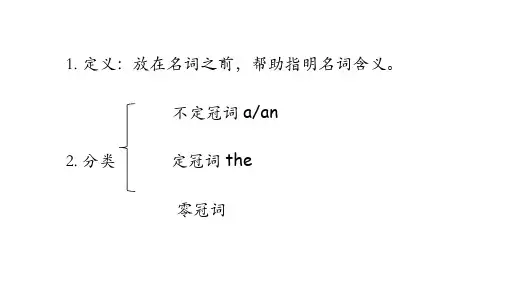


冠词一、定义。
冠词是虚词,本身不能单独使用,也没有词义,它用在名词的前面,帮助指明名词的含义。
冠词可以说是名词的一种标志,它不能离开名词而独立存在。
二、冠词的分类1、不定冠词"a,an",不定冠词表示泛指、类指。
a、an仅用在单数可数名词前来表示“一”的意义,但不强调数目概念,只表示名词为不特定者。
"a"用在以辅音音素开头的词前,而不是辅音字母前;"an"用在以元音音素开头的词前,而不是元音字母前。
例如hour,第一个元音是“a”,故用an。
当字母单独出现时 A E I O R S F H L X 也要使用不定冠词"an",其次特别要注意的是U 这个字母单独出现发的并不是元音同理university、usual也都不用不定冠词"an”。
但uncle要用“an”确定用“a”还是“an”,有一个口诀:不见“原因(元音)”别施“恩(n)”。
2、定冠词"the",定冠词表示特指、专指、类指。
the用在可数名词单数、复数,不可数名词前均可。
3、零冠词"(/)"三种,零冠词指的是不用冠词的情况。
零冠词表示泛指人或事物、类指。
(/)则表示名词化的其他词或专有名词,因此单数复数均可。
三、基本用法。
(1)不定冠词可数名词单,需用a或an,辅音前用a,元音前用an。
1. 用于可数名词的单数形式之前,表示"一"There is a tiger in the zoo.动物园里有一只老虎。
A hundred and more people attended this meeting.100多人参加了这次会议。
2. 表示一类人或事物A tiger can be dangerous.老虎可能有危害性。
3. 表示"某一个"的意思A gentleman wants to see you.有一位先生要见你。
4. 表示"同一"的意思They are nearly of an age.他们几乎同岁。
The two shirts are much of a size.这两件衬衫大小差不多。
5. 表示"每一"的意思We go swimming four times a week.我们每周去游泳四次。
6. 用在作表语的单数可数名词前,表示身份、职业My mother is a teacher.我妈妈是教师。
7. 第一次提到的人或事物,但不特别指明是哪一个Long long ago there was an old king who had a very beautiful daughter.很久很久以前,有一个年老的国王,他有一个非常美丽的女儿。
8、用在某些表示数量的词组中:a lot of 许多a couple of 一对a great many 很多a dozen 一打(但也可以用one dozen)a great deal of 大量9. 在such a,quite a句式中,表示相当、十分He is quite a good actor. 他是一个相当好的演员。
Don't be in such a hurry。
不要如此匆忙。
10.用语习惯用语中all of a sudden 突然as a result 结果 a little 一点;一些 a bit 一点a great many=a very large number of 许多;大量 a great deal(of...) 许多a lot(of...)许多have a cold 感冒have a good(nice,wonderful,great)time 玩得高兴pay a visit 拜访(1)定冠词巧计定冠词the用法歌诀:特指双方熟悉,上文已经提起。
世上独一无二,方位名词乐器。
某些专有名词,还有复数姓氏。
序数词最高级,习惯用语牢记。
1. 用以特指某(些)人或某(些)事物This is the house where Luxun once lived.这是鲁迅曾经住过的房子。
2. 用于指谈话双方都明确所指的人或事物Open the door, please. 请把门打开。
3. 用以复述上文提过的人或事物(第一次提到用“a或an”,以后再次提到用“the”)Once there lived a lion in the forest. Every day the lion asked small animals to look for food for him. 从前森林里住着一只狮子。
每天这只狮子要小动物们为他寻找食物。
4. 用在序数词和形容词最高级前January is the first month of the year. 一月份是一年当中的第一个月。
He is always the first to come and the last to leave. 他总是第一个来最后一个离开。
Shanghai is the biggest city in China. 上海是中国最大的城市。
5. 表示地球、宇宙等独一无二的事物the sun 太阳the moon 月亮the earth 地球the sky 天空the world 世界6. 指由普通名词构成的专有名词the West Lake 西湖the Great Wall 长城the United States 美国the United Nations 联合国the Browns 布朗一家the English 英国人the WTO 世界贸易组织7. 表示地点、方位、时间用于表示地点、方位,具体的时间或某天的一部分等。
in the east 在东方in the west 在西方in the front 在前面at the back 在后面in the bottom 在底部at the top 在顶部on the right 在右边on the left 在左边8. 在海洋、江河、湖泊、山脉、海峡、海湾等地理名词前the Pacific Ocean 太平洋the Huanghe River 黄河the Tianshan Mountains 天山山脉the Taiwan Straits 台湾海峡9. 在姓氏复数前,表示一家人The Bakers came to see me yesterday.贝克一家人昨天来看我。
10. 和某些形容词连用,使形容词名词化,代表一类人或物the poor 穷人the rich 富人the sick 病人the wounded 伤员the good 好人the beautiful 美丽的事物11. 用于西洋乐器前(民族乐器前不加)play the piano 弹钢琴play the violin 拉小提琴*中国乐器名词前不与冠词连用:play erhu(二胡)]the+n{发明物} 必须是单数who invented the telephone?12. 某些固定的表达法in the morning 在早上in the afternoon 在下午in the evening 在晚上go to the cinema 去看电影go to the theatre 去看戏all the year round 一年到头on the way to 前往...去的路上13. the加单数可数名词可以表示一类人或事物The horse is a useful animal. 马是一种有用的动物。
=A horse is a useful animal.14.可用定冠词the+形容词(代表一类人)The poor are still poor.15.用于姓名前the Taylors(泰勒的一家人)(3)零冠词一年四季定三餐,球类棋类限定全,颜色国家不可数,复数泛指学科前,对等名词and连,turn\go 作系表前,称呼头衔表补同,语言节日不用冠。
1. 专有名词、物质名词、抽象名词前一般不加冠词(在特指时加冠词)(/)China 中国(/)Europe 欧洲(/)Money 金钱(/)Music 音乐(/)Lei Feng 雷锋(/)William Shakespeare 威廉·莎士比亚2. 月份、星期、节日前一般不加冠词(在特指时加冠词)(/)January 一月份(/)Sunday 星期日(/)Christmas Day 圣诞节(/)Thanksgiving 感恩节(/)National Day 国庆节(/)May Day 劳动节比较:...on a Sunday morning.在一个星期天的早晨... (表示某一个。
)注:民族节日前要加the 如:the Spring Festival3. 三餐、四季前一般不加冠词I have (/)lunch at (/)school. 我在学校吃午餐。
(/)Summer is the best season for swimming. 夏天是游泳的好季节。
比较:I had a big lunch yesterday. 昨天我吃了一顿丰盛的午餐。
(表示某一个)The dinner given by Mr Smith was very nice.史密斯先生款待的晚宴真是美味。
(表示特指)比较:I will never forget the summer we spent in Hawaii.我永远不会忘记我们一起在夏威夷度过的那个夏天。
(表示特指)三餐名词单独使用时,之前通常不加冠词,三餐名词之前若加形容词时则除外:4. 进行球类运动play (/) basketball 打篮球play (/) volleyball 打排球play (/) football 踢足球5. 固定词组go to (/) school 去上学go to (/) bed 上床睡觉go by (/) train 乘火车去go by (/) boat 乘船去at (/) table 在用餐in (/) hospital 住院at (/) school 求学in (/) school 求学at (/) noon 在中午at (/) night 在晚上at (/) midnight 在半夜in (/) town 在城里四、冠词的位置(1)不定冠词位置不定冠词常位于名词或名词修饰语前。
注意:a. 位于下列形容词之后:such,what,many,half,I have never seen such an animal.Many a man is fit for the job.b. 当名词前的形容词被副词as, so, too, how, however, enough修饰时,不定冠词应放在形容词之后:It is as pleasant a day as I have ever spent.So short a time.Too long a distance.c. quite,rather与单数名词连用,冠词放在其后。